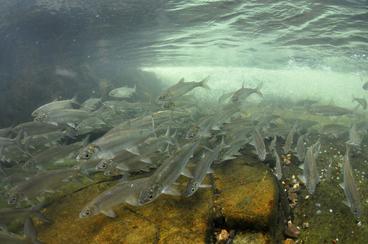
Inland fisheries have high cultural, economic, and subsistence value.
Challenge: Managers lack capacity to manage fisheries and address complex issues in a changing climate.
Principal Investigator(s):
- Chris Cahill (Michigan State University)
Co-Investigator(s):
- Holly Embke
Cooperator/Partner(s):
- Gretchen Hansen (University of Minnesota – Twin Cities)
- Greg Sass (Wisconsin Department of Natural Resources)
- Patrick Schmalz (Minnesota Department of Natural Resources)
- Aaron Shultz (Great Lakes Indian Fish and Wildlife Commission)
- Lynn Waterhouse (Minnesota Cooperative Fish and Wildlife Research Unit)
Inland fisheries have tremendous cultural, economic, and subsistence value. However, climate change brings new stresses to land-locked fisheries that raise novel challenges for resource managers. One fundamental challenge in inland fisheries is how to best assess and manage data-limited fisheries when resources are finite and uncertainty is pervasive. To address this challenge, we will use quantitative models to examine whether indicators of fish population status commonly-measured by managers can serve as a “short-cut” to more data- and capacity-intensive approaches. Further, we will work and communicate directly with state and Tribal fisheries managers to better understand the challenges they face when making difficult conservation decisions given climate change. We will share and discuss these findings with fisheries managers and researchers in the upper Midwest in a formal summary workshop. Through the combination of models and management discussions, we will establish whether there are metrics that can be leveraged by managers to give the best information about fish population change and resilience given climate change. Accurately quantifying inland fisheries status and dynamics is critical to understanding how these important ecosystems contribute to local and Indigenous communities and how this may be impacted by global change.
Read more on CASC Project Explorer.
Project Details
Principal Investigator
Chris Cahill
Principal Investigator Organization
Michigan State University
Year
2023
Topic
Science Tools for Managers,
Water, Coasts and Ice,
Wildlife and Plants
Status
In Progress
